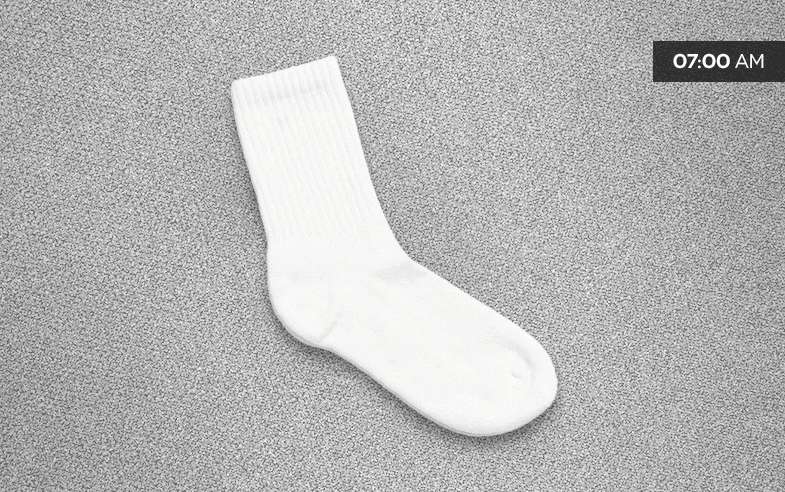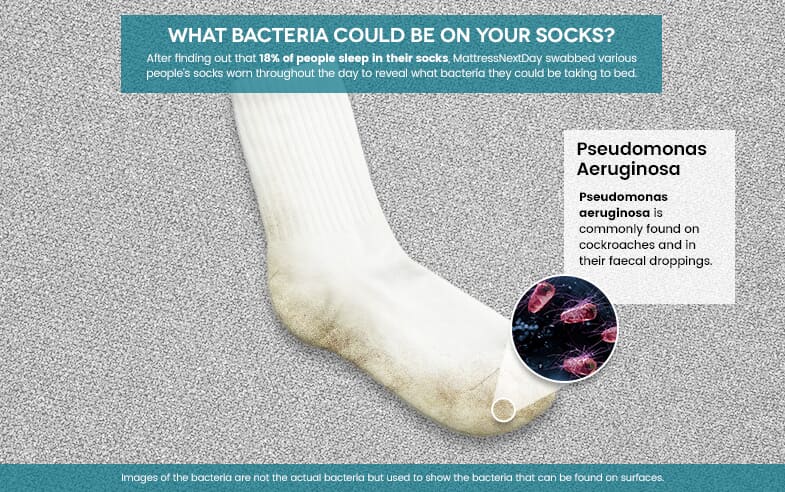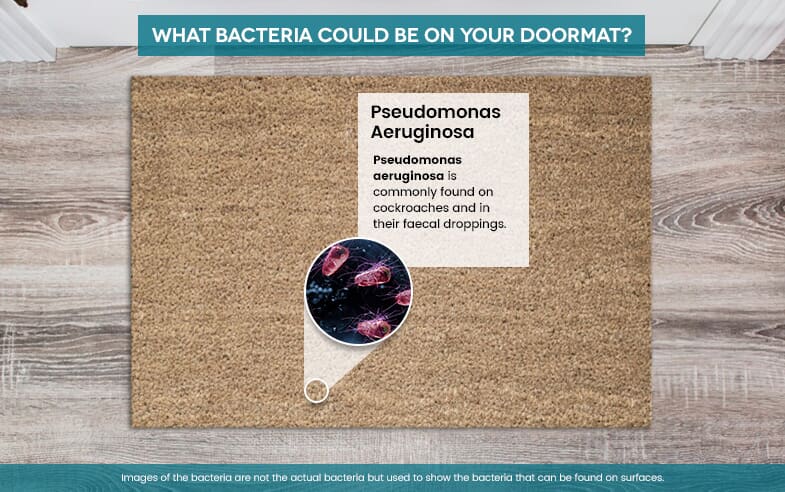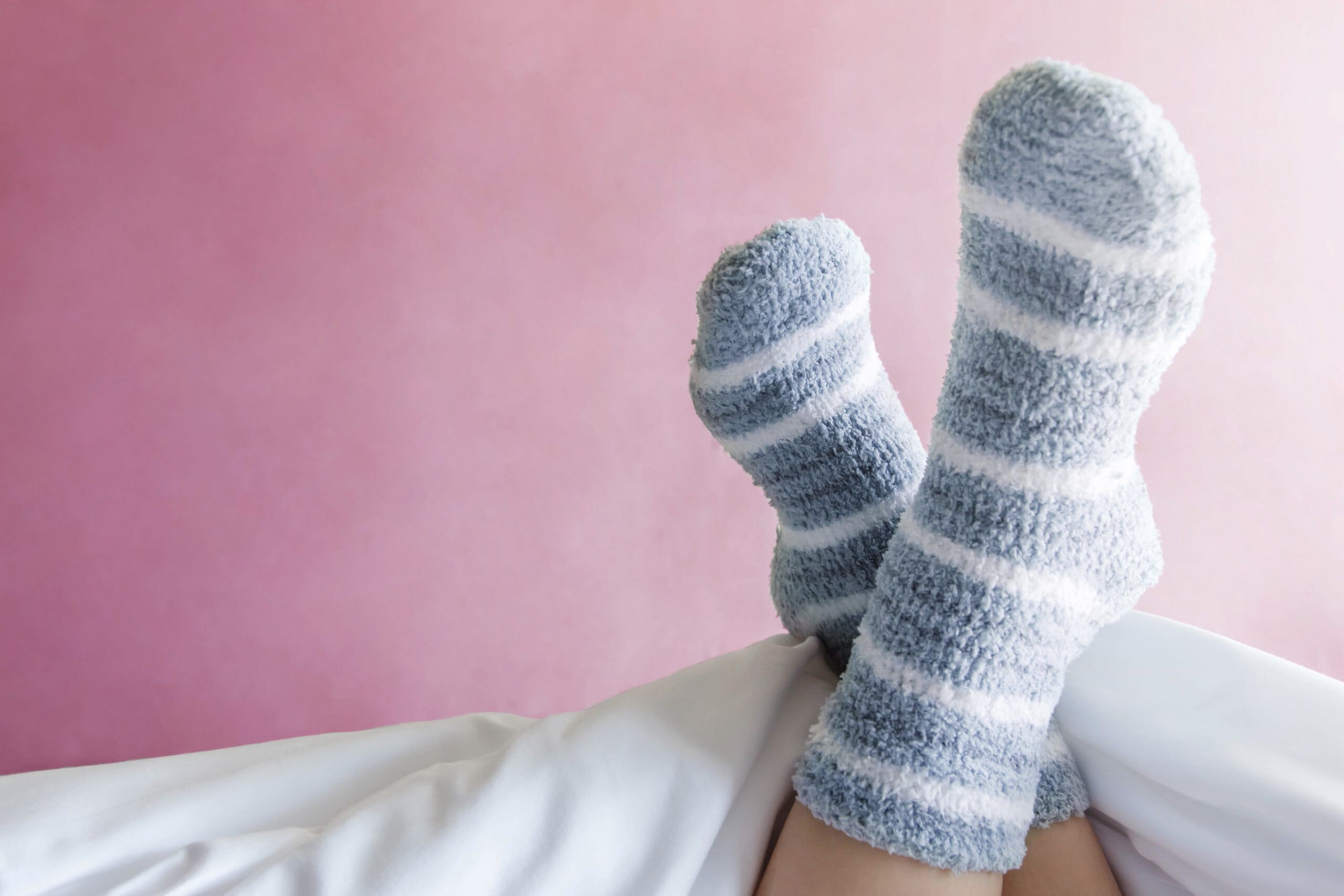Do you wear socks to bed? Or are you one of the many - as discussed on Reddit - that gets the ick when their partner wears socks in bed?
After extensive research, our sleep experts can reveal that you SHOULD be wearing socks to bed as it can lead to higher-quality sleep, a better sex life and more.
However, what you shouldn’t do is go to bed in the socks you’ve been wearing all day. As part of our analysis, we carried out a swab test on people's socks that were worn all day since waking up. We then discovered that faecal bacteria (found in cockroach droppings) were found on two sets of socks tested - all of which could have been transferred onto the bedding of the wearers.
What can lurk in your socks and why do you need to change them daily?
While our sleep experts at MattressNextDay actively encourage socks in bed, you must change your socks daily. We asked 1,017 people around the globe if they sleep in socks. Just short of one-fifth (18%) said they do sleep in socks.
Only 30% change their socks before getting into bed
When conducting a second poll on Reddit, we found that only 30% would change their socks when going to bed to sleep. That means that almost a third are keeping the same socks on that they have worn all day, worn with shoes, worked out in and more.
Our feet have around 250,000 sweat glands - so on an average day, our feet are likely to sweat. Even more so during the spring and summer months. If you wear your socks from waking up to the next day - and work out and do a lot of walking in between - that moisture can build up and the bacteria that causes athlete’s foot can start to develop.
You should also never put socks on damp feet as you can encourage bacterial growth. In the worst cases, this can lead to trench foot. Symptoms of this include blistering, skin and tissue dying and falling off.
A video went viral after a woman stated she got trench foot at seven years old after putting socks on after a shower, while her feet were still wet, and going to sleep. That’s led to people responding with videos such as this.
But trench foot and smelly feet are not the only things you need to worry about if you wear your socks to bed.
We discovered that bacteria found in faecal droppings can lurk on socks after being worn all day and could be transferred to your bedding
We swabbed different pairs of socks to discover what bacteria could grow on the material after being worn from 7am until 11pm. Each person wore the same socks while wearing shoes, working out and going about their daily business.

The socks contained the same bacteria that can be found on cockroaches and in their faecal droppings
Pseudomonas aeruginosa can be commonly found on cockroaches and in their faecal droppings. For those who are immunocompromised, it can cause infections and these infections can affect the airway and urinary tract.
This type of bacteria can also be found in contaminated water and can even cause what is known as ‘hot tub rash’ (dermatitis). For those with already sensitive skin, it can cause even more irritation. This is particularly a concern if you have dry, cracked heels from walking barefoot and not wearing socks to protect your heels.
If surfaces or household items are not properly cleaned, P. aeruginosa can be easily spread. So, it is essential that you manage the cleaning of your clothing, particularly those that you wear for longer than 24 hours (if you choose to sleep in the same socks you have worn during the day).

The same bacteria could be found on the doormat and the socks
Your doormat is likely to be one of the dirtiest items in your home, collecting dirt from outdoor shoes. However, what you might not know is that your socks could contain the same bacteria as that doormat.
Our analysis found that the same bacteria, Pseudomonas aeruginosa, was found on half the male and female socks, as well as the doormat, further highlighting how important it is to change your socks before going to bed as you don’t know what bacteria can be lurking on your socks after wearing them all day!

The socks swabbed contained more bacteria than the remotes
In previous studies, the remote has been dubbed as ‘dirtier than a toilet’. But not just a little bit dirtier, 20 times dirtier than a toilet seat.
However, the swab results we took show that, actually, your socks could be dirtier than your remote with the Pseudomonas aeruginosa only detected on the socks and the doormat, and not the remotes swabbed. Additionally, higher levels of faecal streptococci was found on one of the pairs of socks.
This further highlights how bacteria can be present on certain clothing that you might not realise. By wearing the socks you have worn all day to bed as well, you could be spreading bacteria into where you sleep (and spend a third of your life).
If you do sleep in socks, wash them at 60 degrees to kill any bacteria present
While the swab results may shock you, it does not mean that you will definitely catch an infection or get ill from your socks. However, it does highlight the bacteria that could be found in the home and even which type of bacteria can survive on dry surfaces that you might not realise.
Luckily, there is an easy way to combat this. Always make sure you wash your socks, and any underwear for that matter, at 60 degrees. This temperature will help to kill any bacteria, viruses and even get rid of tough stains.
We also recommend you wash your bedding at this temperature due to the amount we sweat at night. However, we understand that this can increase the cost of your energy, so try to dry your bedding outside where possible to reduce any reliance on the dryer. Drying outside will also help your bedding last longer.
What are the benefits of wearing clean socks to bed?
Although wearing socks all day and not changing them to go to bed could see bacteria grown on your socks, there are benefits to wearing CLEAN socks to bed. As revealed in our poll, for the more than four-in-five (82%) not wearing socks to bed, you are missing out on a number of benefits.
1. You are more likely to orgasm while wearing socks
For the 82% that don’t wear socks, you could be ruining your sex life. Did you know that putting on a pair of socks can cause the blood vessels in your feet to dilate and improve blood flow? And, that improved blood flow leads to better sex and a much better climax.
The University of Groningen, in the Netherlands, studied a group of 13 heterosexual couples. They found that 80% were able to reach an orgasm with socks, while only 50% could do so without socks. That’s a staggering difference of 30% that could be attributed to cold feet.
Our feet - and hands - get colder faster than any other part of our body. The cold restricts blood flow as it causes blood vessels to constrict, and the fingers, hands and feet are the first to feel this. With less blood circulating, you are less likely to reach orgasm. So, if you have noticed issues in the bedroom, a pair of socks could add a spark back to your sex life.
Likewise, as socks warm you up and provide comfort, that feeling can help build on your emotional connection with your partner or the person you are having sex with. Although, we recommend changing your socks - if you have been wearing them all day - as bacteria can start to build up in your socks and even lead to fungal infections.
So the lesson is, you should wear socks during sex. But just make sure they are clean.
2. Have insomnia? Wearing socks could stop you from waking during the night
If you have insomnia, you will know how hard it is to go to sleep and stay asleep. You’ll likely wake up during the night and feel tired throughout the day.
However, a study recently found that for those wearing socks, the number of awakenings during the night was 7.5 times lower than the group without socks. Sleep efficiency was a further 7.6% higher if people opted for socks as part of their nightwear.
According to Martin Seeley, the CEO of MattressNextDay, “Insomnia is a disorder that affects around 10 - 30% of the worldwide population. That is a huge amount of people that could see further issues in their daily life due to insomnia affecting mood and productivity. While we are not saying that socks can cure insomnia, they could help.
“I suggest testing it out and creating a calming environment in your bedroom. Remove any stimuli such as your TV, phone or laptop and stop using them two hours before bed as the blue light emitted can ‘kid’ your brain into thinking it is time to wake up. Alongside this, wear socks and track your sleep quality during the week to see what improves your nighttime routine.”
3. You’ll sleep for around 30 minutes longer wearing socks
Not only will you wake up fewer times during the night by wearing socks to bed, but the same study discovered that those who slept in socks slept for 32 minutes more.
This is because wearing socks and warming your feet stops the cold air from escaping and regulates the body’s core temperature.
4. Socks could even stop you from snoring
While this might be a different type of sock, wearing flight socks during the day - to be swapped with a pair of cotton socks (or another breathable material) at night - can lead to a more restful night.
A university found that flight socks, worn during the day, prevent the build-up of fluid - that travels up the body when the person is lying down and can cause snoring - by squeezing your lower leg. The study found that disruptions in sleep were cut in half due to these socks.
5. You are less likely to get hot flushes
Socks during a heatwave or summer months can actually help you sleep better.
What’s more, they can even help to prevent any hot flashes for women in menopause.
Contrary to popular belief, you won’t overheat in socks. Quite the opposite, in fact. Your circadian rhythm - which signals when it is time to go to bed and wake up and controls your sleep patterns - also affects your body temperature, which drops during the night.
However, by sleeping with socks on, you regulate the temperature cycles your body goes through during the night, thus improving your sleep. As socks can help regulate your body temperature during sleep, you can also prevent some of the worst symptoms of hot flushes.
You can read more on our seven top tips to further prevent hot flushes during menopause.
However, it’s crucial that you ensure you wear clean socks before bed as dirty socks - used for more than one day or are put on while feet are damp, for instance - can actually contribute to bad hygiene.
6. Your feet will be more moisturised just in time for spring/summer
Do you find your feet - in particular, your heels - are dry, cracked and sore when you wake up? Socks could be the answer.
Try not to walk around your home barefoot or wear shoes that mean your heels are exposed if you have cracked and dry heels. You could make them worse as you are stopping them from repairing, while also inviting unwanted bacteria into the cracks.
According to Martin, “What you can do, however, is reach for a pair of cotton socks before bed. Cotton is a breathable material that will allow your heels to breathe, while also protecting them during the night. Plus, as you are wearing socks, your heels can soak up the moisture that will help repair your heels. As this will also help reduce the irritation from dry cracked heels, your sleep quality could improve.”
Methodology
We conducted two polls on Reddit and asked:
- Do you sleep in socks?
- If you sleep in socks, do you change them before bed?
We then analysed the 1,130 votes.
In addition, we then swabbed eight male and female socks that had been worn since the person woke up, to when they went to bed, and compared the swabs to household items; the doormat and remote, to highlight bacteria on socks to items that are considered the dirtiest in the home.






